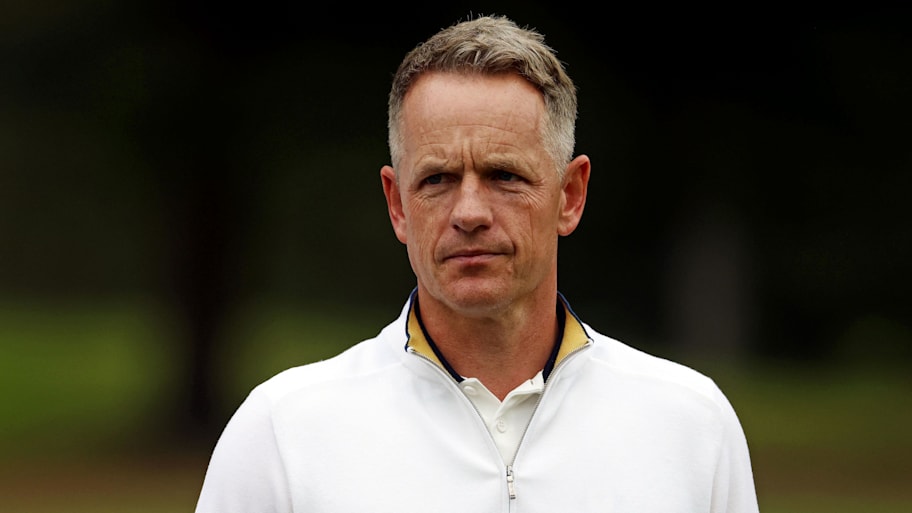FARMINGDALE, N.Y. — President Trump will attend the Ryder Cup on Friday, which means that at around 11 a.m., he will say he beat Rory and Seve, 7 and 6, by himself. So that’s one point for the United States. Another 13.5 and the party is on.
Starting with the Opening Ceremony, which was moved up to Wednesday this year to allow 48 hours for the hot air to dissipate, the Ryder Cup produces the weirdest vibes in men’s golf. It is intense and it’s highly partisan, but what it has not been lately is close.
The last five Ryder Cups have been blowouts, with the home team winning them all. Generally speaking, when the Ryder Cup is played on U.S. soil, the Americans go full-tariff on the Europeans before popping bottles of sparkling wine and calling it “Champagne,” while Ryder Cups in Europe end with Americans fielding questions like, “In 2,000 words or more, why do you hate this event and each other?”
In the Ryder Cup, Europe is SEC football, perpetually claiming It Just Means More. But if the Americans do not care as much about the Ryder Cup, how did they win 17-11 at Hazeltine in 2016 and 19-9 at Whistling Straits in 2021? If the Europeans are so close that they could all share a putter, why did they put up so little resistance?
There was a stretch when Europe cared more, prepped better and won most of the time. But that has not been true for a while. The Europeans have an excellent chance this week because top to bottom, their team might actually be better. The “United Europe, Divided America” bit is mostly a troll to get in Americans’ heads.
You might recall the report at the last Ryder Cup that Patrick Cantlay was so upset about not getting paid that he refused to wear a team hat, and that his stance was somehow splitting the U.S. team. This led to Cantlay insisting that he simply could not find a hat that fit, which was hard to believe, and also that he did not think players should get paid, which was even harder to believe. But the least believable part of the whole story was that Cantlay’s views were destroying team chemistry.
I’m not saying everybody wants to get paid. But if you really think that American golfers care so passionately about not getting paid that simply sharing a team with somebody who wants to get paid ruins their Ryder Cup, I would like to introduce you to an American golfer. Some of them would place sponsor logos inside their sponsor logos if they could get away with it.
Patrick Cantlay Is Exhibit ‘A’ for Storylines Outrunning Facts
Of all of the players here, Cantlay is perhaps the best example of a lazy narrative running circles around the facts. It is true that he deftly accumulated power behind closed PGA Tour doors; that he sometimes plays slow, methodical, maddening golf; and that he has done a better job of getting paid (he is 14th on the Tour’s all-time money list) than winning (zero majors). So it’s easy to view him as everything that is wrong with America at the Ryder Cup.
The opposite is true: Cantlay is 5–2–1 in Ryder Cup matches. His only losses came in Italy two years ago, in the format that Americans rarely play (foursomes). Both matches ended on the 17th hole. On Saturday afternoon, when the Americans were staggering and the hat story spread, a feisty Cantlay won his match alongside Wyndham Clark. In singles the next day, Cantlay made 12 pars and five birdies and beat Justin Rose on the 17th hole.
Americans are getting paid this time around. Well, the Ryder Cup is a commercial sporting event that brings in a ton of revenue for a lot of people. Paying the people who play in it strikes me as … normal. If this week is just about patriotism and supporting the humble, working-class folks at the PGA of America, then why did PGA of America president Seth Waugh get paid $3.8 million last year? Doesn’t he love his country?
So when European captain Luke Donald says his players don’t want to get paid, understand: He is feeding the perception that Americans play for cash and Europeans play for each other, because it helps his team. Whatever Americans do with their checks—several have said they are donating the money to charity—will have no bearing on who wins this week.

When you hear that LIV YouTuber Bryson DeChambeau is ruining American team chemistry, ignore it. It’s not reality. The current iteration of Bryson is far too polished and concerned with his reputation to ruin team chemistry: Being a good teammate is a challenge he wants to accomplish. DeChambeau might be a difficult partner, simply because he approaches the game differently from everyone else. It can be hard playing with a guy like that. But that’s not the same as being a bad teammate.
There is a photo in the media tent of the 2021 U.S. team celebrating its victory, and a couple of things stand out. One is that 11 players are wearing a hat and one—Cantlay—is not. Maybe he really does have an unusually shaped head. Or maybe he was protesting the pay issue in 2021, nobody noticed, and his teammates didn’t care and won anyway.
The other thing that stands out is how much turnover there has been in four years. The three most accomplished U.S. players in 2021 were Jordan Spieth, Brooks Koepka and Dustin Johnson. None of them are here. Neither are Daniel Berger or Tony Finau.
This U.S. team has four new players—Cam Young, J.J. Spaun, Russell Henley and Ben Griffin—who have combined to win 10 PGA Tour events and one major. They are wonderful players. They deserve to be here. They could become Ryder Cup stalwarts. But right now, their resumes are pretty light, and they are one-third of the team. So let’s table the chemistry-and-caring conversation until we have some actual evidence for it.
If the Europeans win, it will be because they are good enough to win. Tip your hat to them—if you’re wearing one.
This article was originally published on www.si.com as The Ryder Cup’s Lazy Narratives Have Dominated, As Have the Home Teams.
